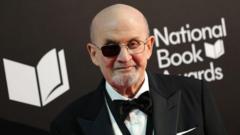Matar’s maximum sentence underscores the seriousness of the crime and the broader implications for free speech and safety faced by artists and writers. During the high-profile trial, Rushdie recounted his harrowing experience, delivering a poignant narrative of fear and resilience.
In his statement before the sentencing, Matar criticized Rushdie, emphasizing his belief in the author's perceived hypocrisy regarding freedom of speech. Despite the gravity of his actions, Matar maintained his innocence by not testifying during the trial. The legal proceedings highlighted contrasting views on artistic expression, public safety, and the impact of literature on cultural tensions.
As Rushdie continues to recover, the incident refreshes discussions on the consequences of literature perceived as blasphemous and the writer's enduring legacy amidst threats that had endangered his life for decades.
In the aftermath of the attack, Rushdie's literary contributions remain both celebrated and contentious, reminding the public of the ongoing complexities surrounding freedom of expression.
In his statement before the sentencing, Matar criticized Rushdie, emphasizing his belief in the author's perceived hypocrisy regarding freedom of speech. Despite the gravity of his actions, Matar maintained his innocence by not testifying during the trial. The legal proceedings highlighted contrasting views on artistic expression, public safety, and the impact of literature on cultural tensions.
As Rushdie continues to recover, the incident refreshes discussions on the consequences of literature perceived as blasphemous and the writer's enduring legacy amidst threats that had endangered his life for decades.
In the aftermath of the attack, Rushdie's literary contributions remain both celebrated and contentious, reminding the public of the ongoing complexities surrounding freedom of expression.



















